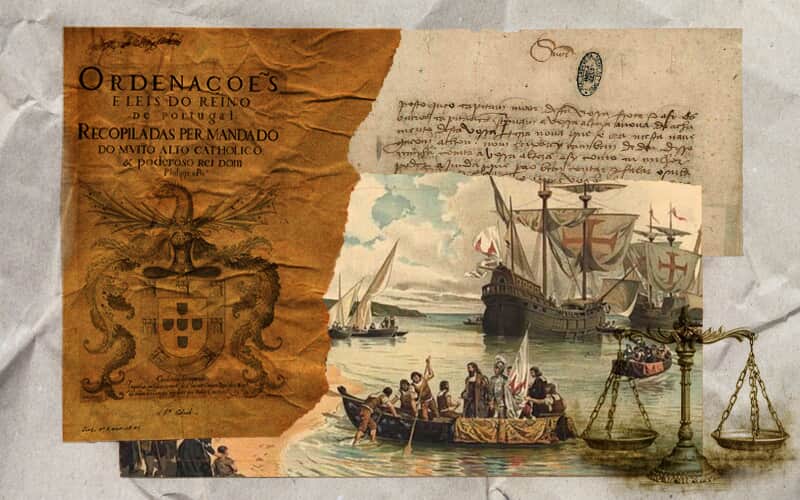April 22nd
On April 22, 1500, the landing of the Portuguese profoundly transformed the land renamed Brazil, in aspects as extensive as the territorial area of the New World.
Since colonization, Portugal imported its customs, beliefs and organizational, political and legal models to the new land. After 524 years, it is still possible to notice remnants of Portuguese influences in legal production and structuring of the Brazilian Judiciary.
524 years ago, the Portuguese arrived in Brazil, producing changes of various orders, including legal ones.
Legal model
The Lusitanians developed their legal system along Roman-Germanic lines (civil law), a system of codified laws that contrasts with common law, present in countries such as the United Kingdom and the United States.
According to Renato Afonso Gonçalves, president of Casa de Portugal, Portuguese Law had a significant impact on colonial Brazil, influencing Civil, Criminal, Administrative and Procedural Law.
Many of the first Brazilian laws were adapted or copied from Portuguese legislation. An example is the Philippine Ordinances, a comprehensive 16th century code that predominated in Brazil until it was gradually replaced by national legislation, such as the Criminal Code of 1830, the Code of Criminal Procedure of 1832, the Commercial Code of 1850 and the Civil Code of 1916.
In Civil Law, the rules regarding property and real rights, such as usufruct, servitude and mortgage, in addition to family and succession regulations, obligations and contracts, legal personality, possession, adverse possession and civil liability reflect Portuguese heritage.
In the criminal sphere, Brazil maintained Portuguese roots in concepts such as culpability and legality, although since the Penal Code of 1890 it began to integrate influences from other legislation, such as Italian and German legislation.
Furthermore, Brazilian Administrative Law initially preserved the centralization of power typical of the Portuguese monarchy. Land management, commercial regulation, the organization of municipal councils and the implementation of administrative principles are also legacies of Portuguese influence.
Organization of the Judiciary
Brazil's judicial institutions are heavily based on the Portuguese model. This includes the structure of courts and the organization of the legal careers of judges and prosecutors.
During the colonial period, Brazil adopted a hierarchical judicial structure similar to that of Portugal, with 1st and 2nd instance courts established by the Portuguese Crown, such as the " in the provincial capitals. These courts, following the Portuguese model, guaranteed the application of the laws of the metropolis.
A significant example of Portuguese influence was the creation of the Court of Appeal of Rio de Janeiro in 1751, the second court of appeal in Brazil, which had similar functions to the courts of appeal in Portugal.
The appointment of judges and ombudsmen followed the Portuguese pattern, occupied by magistrates coming from Portugal or colonists trained in Law at Portuguese universities, exercising judicial and administrative functions.
The Philippine Ordinances also established standards for the organization of courts and judicial procedures, influencing the conduct of processes and the behavior of magistrates in Brazil.
Universities
The training of jurists in Brazil was also shaped by Portuguese educational models and practices. The first national law schools, such as those in Olinda and São Paulo (1827), were founded following the model of Portuguese universities.
Renato Afonso Gonçalves states that until the creation of Brazilian law universities, jurists graduated in Coimbra. Therefore, the training of legal professionals had a solid basis in Portuguese legal principles.
The universities' curriculum included common subjects in Portuguese legal education, such as Civil Law, Canon Law, Public Law and Natural Law. The methodology was based on memorizing laws and interpreting classical texts.
Break?
According to the president of the House of Portugal, Brazil's independence in 1822 marked the rupture between the Portuguese and Brazilian systems. From then on, Brazil began to develop its laws and legal institutions, and gradually distanced itself from the direct influence of Portuguese law.
However, even with the development of a separate legal culture, Brazil never completely separated itself from Portuguese influences.
After the Carnation Revolution in 1974 and the new Portuguese Constitution of 1976, which consolidated fundamental rights and democratic principles, Brazil, still under a military dictatorship, was inspired by these events to strengthen its own movements, culminating in the 1988 Constitution.
.

 Mr. Alessandro Jacob speaking about Brazilian Law on "International Bar Association" conference
Mr. Alessandro Jacob speaking about Brazilian Law on "International Bar Association" conference